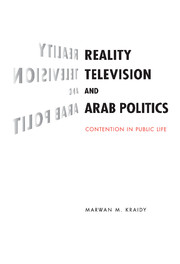Book contents
- Frontmatter
- Contents
- Acknowledgments
- Preface
- Introduction: Beyond al-Jazeera
- 1 Screens of Contention: The Battle for Arab Viewers
- 2 Voting Islam Off the Island? Big Brother in Bahrain
- 3 The Saudi-Lebanese Connection
- 4 Contesting Reality: Star Academy and Islamic Authenticity in Saudi Arabia
- 5 Gendering Reality: Kuwait in the Eye of the Storm
- 6 A Battle of Nations: Superstar and the Lebanon-Syria Media War
- 7 The “New Middle East”? Reality Television and the “Independence Intifada”
- Conclusion: Performing Politics, Taming Modernity
- List of Interviews
- Further Readings
- Bibliography
- Index
- Titles in the Series
5 - Gendering Reality: Kuwait in the Eye of the Storm
Published online by Cambridge University Press: 05 June 2012
- Frontmatter
- Contents
- Acknowledgments
- Preface
- Introduction: Beyond al-Jazeera
- 1 Screens of Contention: The Battle for Arab Viewers
- 2 Voting Islam Off the Island? Big Brother in Bahrain
- 3 The Saudi-Lebanese Connection
- 4 Contesting Reality: Star Academy and Islamic Authenticity in Saudi Arabia
- 5 Gendering Reality: Kuwait in the Eye of the Storm
- 6 A Battle of Nations: Superstar and the Lebanon-Syria Media War
- 7 The “New Middle East”? Reality Television and the “Independence Intifada”
- Conclusion: Performing Politics, Taming Modernity
- List of Interviews
- Further Readings
- Bibliography
- Index
- Titles in the Series
Summary
As dawn broke over Kuwait on November 16, 2005, the capital city of this small Gulf emirate was hit by a powerful rainstorm whose downpour flooded streets and slowed down the morning commute. By midmorning, a joke dispatched by text messaging had made the rounds of Kuwaiti liberals: “This is not hurricane Katrina,” the banter went, “this is hurricane Ma‘ssuma.” A few months earlier, in early June, Ma‘ssuma al-Mubarak, a professor of political science at Kuwait University and an occasional columnist, made history when the emir of Kuwait designated her minister of planning and development. The ruler had paved the way for this consequential appointment when he decreed the political enfranchisement of Kuwaiti women on May 17, 2005. As the first nonmale to hold a major ministerial portfolio – succeeding a member of the ruling al-Sabah family in that position – al-Mubarak was thrust into the national limelight. The day before the rainstorm, November 15, 2005, Kuwaiti newspapers featured pictures of her on their front pages because she had publicly questioned government recruitment practices that, in her opinion, were discriminatory against women. The hurricane analogy reflected the powerful resonance of a woman's appointment to a high-level government job in Kuwait.
As the rain abated, I made my way to the office of ‘Aisha al-Rshaid, who was among those who received the text-message quip that morning.
- Type
- Chapter
- Information
- Reality Television and Arab PoliticsContention in Public Life, pp. 119 - 143Publisher: Cambridge University PressPrint publication year: 2009



